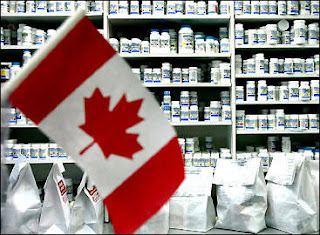 |
| A Google search for “Prescription drugs from Canada” returned more than 35 million results |
"While the legal community continues to ponder the implications of the US Supreme Court’s recent Kirtsaeng ruling on copyright and first sale doctrine (on which see previous Katposts here, here and here), the Supreme Court has ensured that the Kirtsaeng ruling is limited to copyright, at least for now. The Court was asked to review Ninestar Technology Co. v United States International Trade Commission, to determine whether the first sale doctrine would apply to products protected by patents similarly to the way in which Kirtsaeng applied it to copyright products.
The first sale doctrine as it applies to copyrights is codified in US copyright laws. By contrast, the first sale doctrine as it applies to patents has been developed only through common law, which currently defines the “first sale” as applying only to sales made inside the US. Accordingly, a sale outside the US is not considered a first sale that would extinguish the patent owner’s right to control further sale through importation into the US.
By denying certiorari in Ninestar on 25 March the Court leaves the current common law position intact. If the Court had chosen to review Ninestar and issue an opinion on the merits, it would have had the opportunity to rule that the first sale doctrine applies even to first sales taking place overseas – a ruling that would have a huge impact on the pharmaceutical industry. The consequence is that big pharma may continue pricing drug products by geographical region, and Americans remain prohibited from seeking cheaper prescription alternatives from foreign countries (though many people do illegally import drugs from abroad, especially from Canada)".The history of Ninestar can be found on the SCOTUSblog here.
Question remains open as court says "no" to Ninestar
 Reviewed by Jeremy
on
Thursday, April 04, 2013
Rating:
Reviewed by Jeremy
on
Thursday, April 04, 2013
Rating:
 Reviewed by Jeremy
on
Thursday, April 04, 2013
Rating:
Reviewed by Jeremy
on
Thursday, April 04, 2013
Rating:





![[GuestPost] G1/24: Tuning in! A take on the state of proceedings before oral proceedings](https://blogger.googleusercontent.com/img/b/R29vZ2xl/AVvXsEjZhEivE5bp7QOwZsyZXAXbVNYSmLjUthkB2Q7fm1_dpB97u5lIQeyWT9ZadUTAH3Z-hXn13VpW4vBDRPx9emCnoDV6tbUTkyvfmqPv1nNInL8XMdrAtSZ2hcRQr2LjxKovC9wTk_XyZxQ0CtX1MUrO_Muz3OJ4ld8AftymsdUmKD7xNksYMwk6/s150/Picture%201.png)

![[Guest post] ‘Ghiblification’ and the Moral Wrongs of U.S. Copyright Law](https://blogger.googleusercontent.com/img/b/R29vZ2xl/AVvXsEhxl1BQBAW3Y-asjb1xXB9eA4DYy77fky6WgR-prC-_6DeBbDqOgCUDWyiz0Q3B23MWWAXnkbS2H2js7OUwA0JQXAHmsyVFgGIHeJz7zJ791vTzOD-4SJqWFIuywFXQyd3ahybbdZd4e8IEVfcNqctvyR8lumv_Gix6Tsw5cSvbHpTI1nwvztDuAQ/s150/IMG_2179.HEIC)



![[Guest book review] The Handbook of Fashion Law (with a discount code)](https://blogger.googleusercontent.com/img/b/R29vZ2xl/AVvXsEgB4h2AdqJKwq9O3Ft4Mb7C39tv_NeFpkzrOfvhIsuwAkM_ops2Hgj7fdwzq_TQsjQDvQrQa-yyC9Q9pNiugseXRlUaMdsr_cmYUbh9lH8HDECMCbsTuNboVgpafyEhkgDkVS6ruHkuz8Sx0QVGI_1S8R9kbsHdNIYrRjqhyphenhyphen010_txjJUYvlZOtWA/s150/Fashion%20Law%20Book%20Bicture.jpg)




No comments:
All comments must be moderated by a member of the IPKat team before they appear on the blog. Comments will not be allowed if the contravene the IPKat policy that readers' comments should not be obscene or defamatory; they should not consist of ad hominem attacks on members of the blog team or other comment-posters and they should make a constructive contribution to the discussion of the post on which they purport to comment.
It is also the IPKat policy that comments should not be made completely anonymously, and users should use a consistent name or pseudonym (which should not itself be defamatory or obscene, or that of another real person), either in the "identity" field, or at the beginning of the comment. Current practice is to, however, allow a limited number of comments that contravene this policy, provided that the comment has a high degree of relevance and the comment chain does not become too difficult to follow.
Learn more here: http://ipkitten.blogspot.com/p/want-to-complain.html